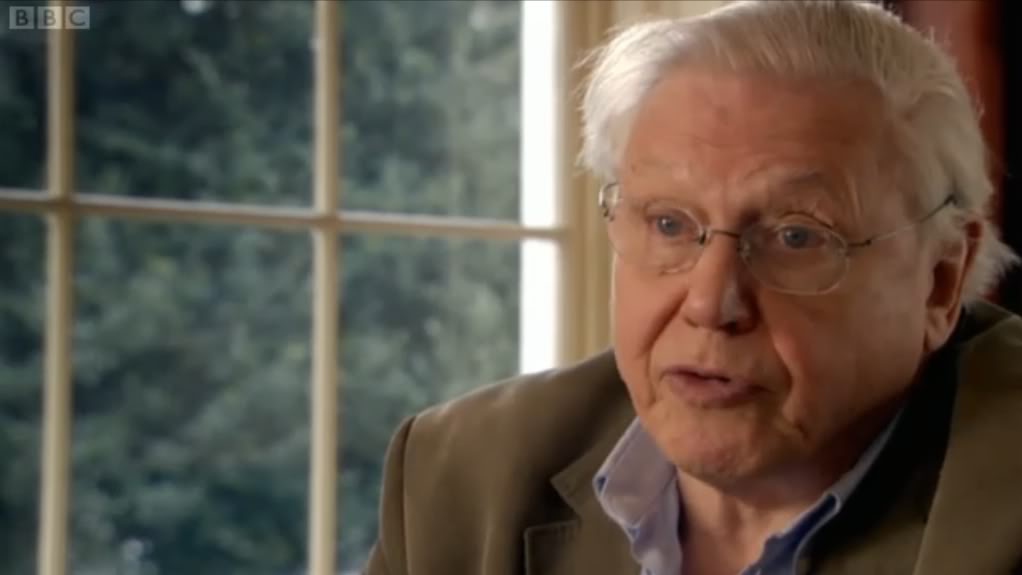I recommend David Attenborough’s excellent documentary How Many People Can Live on Planet Earth?, which can be viewed on BBC iPlayer here for the next four days on YouTube here. He observes that the human population has increased from 2.5 billion to nearly 7 billion in his lifetime, and begins to ask some of the key questions about how we might respond to the challenges that brings.
It was interesting to note, however, that despite the litany of limiting factors on future population growth described in the programme, it was universally agreed that our numbers will surely increase by another couple of billion or so.



For anyone who missed it on iPlayer, David Attenborough’s Horizon on population can be watched at https://www.youtube.com/watch?v=nLfwuPKOrpA
Anyone who understands ‘peak oil’ (peak everything!), the falling energy returns from fossil fuels and the climate chaos we are setting in motion right now would not be able to seriously suggest that there will be 9 or 10 billion people on the planet in 2050. We’ll be doing well if there are 3 billion by 2050 – by that I mean we would have, say, instigated permaculture principles globally to provide food and restore soils & forests, localised the production of essentials (iPods & camera phones not being essentials!), eliminated ‘waste’, kicked the fossil fuel habit etc. This sounds fanciful but it’s what has to happen if we want a just future.
The whole idea of how the human population will decrease over coming decades is indeed dark – the only optimism I have is the hope that if enough people wake up to the problem and start acting now (such as Transition groups), we may just be able to ensure that those who do remain all have a reasonable quality of life. Yes, it’s horrible but sticking our heads in the sand is not an option. We’re supposed to be the smartest species on the planet – it’s time to start acting like it!
PS Cheers Shaun for the site – loved the cap & trade rap & story videos!
Thanks Mandy,
I have updated the post with the new link. Despite the lack of dissenting voices in the programme about the population projections, I’m sure you would agree that it’s a very useful look at these issues, from a trusted voice. I know that many have been asking him to make this programme for some time.
The problem with concentrating on population is that it provides people with high-consumption lifestyles with a tool for berating those with large families: typically that means that affluent Westerners can look down on the poor and the foreign, and use their sheer weight of numbers to excuse their own pampered inactivity. Monbiot has a good piece on this: The Population Myth.
The full issue is surely a more complex combination of consumption and numbers, with the weight of responsibility much more on the shoulders of the individual who consumes the carbon of two to reduce their consumption, rather than for one of every two poor people to stop having babies. When the habits of a Western lifestyle can easily emit around ten times the carbon of a Vanuatan one, then the size of that Vanuatan’s brood isn’t really here or there unless they’re really getting it awwn in Vanuatu. I guess most of them don’t have a telly to distract them.
Hi Smallbeds – I totally agree that one of the factors in understanding the Earth’s carrying capacity is not just the number of people but their combined consumption of resources. However, given that the global population before we started converting fossil fuels into food was just over one billion, we have to consider population decrease over the next century & stop referring to 9 billion by 2050 as if everything will carry on as is.
I don’t think we should “concentrate” on population – as you say, it is one of many factors. What we should focus on is energy in its widest sense (i.e. including food). Few people seem to realise that our technological wizardry has largely been possible because of the vast energy bank of fossil fuels. There is a tendancy to believe that we can do anything if we just put our minds to it – not the case. We have to remain within the laws of nature!
Global population is one of the increasing number of ‘elephants in the room’ so I was pleased to see a respected character such as David Attenborough discussing it on mainstream TV. I wonder if he could be persuaded to do a programme on ending growth economics? : )
Yep, agree with just about everything both of you say. As I put it in my book,
“While population growth rates are significantly higher in Bangladesh (2%) and Ethiopia (3.2%) than in the UK (0.3%) the difference between our levels of consumption is an order of magnitude greater, meaning that the UK growth rate in greenhouse gas emissions and ecological impact due to increasing population is considerably higher than that of these developing countries.
This also emphasises that population is not (as some claim) the single most crucial environmental issue. It clearly has a significant effect as a multiplier, but our chosen way of life and ecological footprint are bigger contributors to climate change, energy resource depletion and the other challenges facing us today and in the near future.”
As you say Mandy, ‘elephants in the room’ abound. Soon we may have to replace ‘can’t see the wood for the trees’ with something about not being able to see the herd for the elephants… Especially given the rate of deforestation I guess!